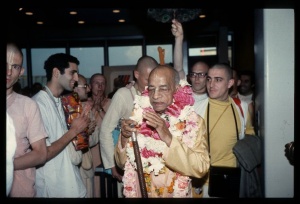SB 4.28.38: Difference between revisions
m (1 revision(s)) |
No edit summary |
||
| Line 1: | Line 1: | ||
{{info | {{info | ||
|speaker= | |speaker=Nārada Muni | ||
|listener=King | |listener=King Prācīnabarhiṣat | ||
}} | }} | ||
[[Category:Srimad-Bhagavatam - Canto 04 Chapter 28]] | |||
[[Category:Bhagavatam Verses Spoken by Narada Muni - Vanisource|042838]] | |||
<div style="float:left">'''[[Srimad-Bhagavatam]] - [[SB 4|Fourth Canto]] - [[SB 4.28: Puranjana Becomes a Woman in the Next Life|Chapter 28: Purañjana Becomes a Woman in the Next Life]]'''</div> | |||
<div style="float:right">[[File:Go-previous.png|link=SB 4.28.37]] '''[[SB 4.28.37]] - [[SB 4.28.39]]''' [[File:Go-next.png|link=SB 4.28.39]]</div> | |||
{{RandomImage}} | |||
==== TEXT 38 ==== | ==== TEXT 38 ==== | ||
<div | <div class="verse"> | ||
tapasā vidyayā pakva- | :tapasā vidyayā pakva- | ||
kaṣāyo niyamair yamaiḥ | :kaṣāyo niyamair yamaiḥ | ||
yuyuje brahmaṇy ātmānaṁ | :yuyuje brahmaṇy ātmānaṁ | ||
vijitākṣānilāśayaḥ | :vijitākṣānilāśayaḥ | ||
</div> | </div> | ||
| Line 16: | Line 22: | ||
==== SYNONYMS ==== | ==== SYNONYMS ==== | ||
<div | <div class="synonyms"> | ||
''tapasā''—by austerity; ''vidyayā''—by education; ''pakva''—burned up; ''kaṣāyaḥ''—all dirty things; ''niyamaiḥ''—by regulative principles; ''yamaiḥ''—by self-control; ''yuyuje''—he fixed; ''brahmaṇi''—in spiritual realization; ''ātmānam''—his self; ''vijita''—completely controlled; ''akṣa''—senses; ''anila''—life; ''āśayaḥ''—consciousness. | |||
</div> | </div> | ||
| Line 23: | Line 29: | ||
==== TRANSLATION ==== | ==== TRANSLATION ==== | ||
<div | <div class="translation"> | ||
By worshiping, executing austerities and following the regulative principles, King Malayadhvaja conquered his senses, his life and his consciousness. Thus he fixed everything on the central point of the Supreme Brahman [Kṛṣṇa]. | By worshiping, executing austerities and following the regulative principles, King Malayadhvaja conquered his senses, his life and his consciousness. Thus he fixed everything on the central point of the Supreme Brahman [Kṛṣṇa]. | ||
</div> | </div> | ||
| Line 30: | Line 36: | ||
==== PURPORT ==== | ==== PURPORT ==== | ||
<div | <div class="purport"> | ||
Whenever the word brahman appears, the impersonalists take this to mean the impersonal effulgence, the brahmajyoti. Actually, however, Parabrahman, the Supreme Brahman, is Kṛṣṇa, Vāsudeva. As stated in Bhagavad-gītā ([[BG 7.19]]), vāsudevaḥ sarvam iti: Vāsudeva extends everywhere as the impersonal Brahman. One cannot fix one's mind upon an impersonal "something." Bhagavad-gītā ([[BG 12.5]]) therefore says, kleśo 'dhikataras teṣām avyaktāsakta-cetasām: "For those whose minds are attached to the unmanifested, impersonal feature of the Supreme, advancement is very troublesome." Consequently, when it is said herein that King Malayadhvaja fixed his mind on Brahman, "Brahman" means the Supreme Personality of Godhead, Vāsudeva. | Whenever the word ''brahman'' appears, the impersonalists take this to mean the impersonal effulgence, the ''brahmajyoti''. Actually, however, Parabrahman, the Supreme Brahman, is Kṛṣṇa, Vāsudeva. As stated in [[Bhagavad-gita As It Is (1972)|''Bhagavad-gītā'']] ([[BG 7.19 (1972)|BG 7.19]]), ''vāsudevaḥ sarvam iti'': Vāsudeva extends everywhere as the impersonal Brahman. One cannot fix one's mind upon an impersonal "something." ''Bhagavad-gītā'' ([[BG 12.5 (1972)|BG 12.5]]) therefore says, ''kleśo 'dhikataras teṣām avyaktāsakta-cetasām:'' "For those whose minds are attached to the unmanifested, impersonal feature of the Supreme, advancement is very troublesome." Consequently, when it is said herein that King Malayadhvaja fixed his mind on Brahman, "Brahman" means the Supreme Personality of Godhead, Vāsudeva. | ||
</div> | </div> | ||
__NOTOC__ | |||
<div style="float:right; clear:both;">[[File:Go-previous.png|link=SB 4.28.37]] '''[[SB 4.28.37]] - [[SB 4.28.39]]''' [[File:Go-next.png|link=SB 4.28.39]]</div> | |||
__NOTOC__ | |||
__NOEDITSECTION__ | |||
Revision as of 15:32, 31 May 2021

A.C. Bhaktivedanta Swami Prabhupada
TEXT 38
- tapasā vidyayā pakva-
- kaṣāyo niyamair yamaiḥ
- yuyuje brahmaṇy ātmānaṁ
- vijitākṣānilāśayaḥ
SYNONYMS
tapasā—by austerity; vidyayā—by education; pakva—burned up; kaṣāyaḥ—all dirty things; niyamaiḥ—by regulative principles; yamaiḥ—by self-control; yuyuje—he fixed; brahmaṇi—in spiritual realization; ātmānam—his self; vijita—completely controlled; akṣa—senses; anila—life; āśayaḥ—consciousness.
TRANSLATION
By worshiping, executing austerities and following the regulative principles, King Malayadhvaja conquered his senses, his life and his consciousness. Thus he fixed everything on the central point of the Supreme Brahman [Kṛṣṇa].
PURPORT
Whenever the word brahman appears, the impersonalists take this to mean the impersonal effulgence, the brahmajyoti. Actually, however, Parabrahman, the Supreme Brahman, is Kṛṣṇa, Vāsudeva. As stated in Bhagavad-gītā (BG 7.19), vāsudevaḥ sarvam iti: Vāsudeva extends everywhere as the impersonal Brahman. One cannot fix one's mind upon an impersonal "something." Bhagavad-gītā (BG 12.5) therefore says, kleśo 'dhikataras teṣām avyaktāsakta-cetasām: "For those whose minds are attached to the unmanifested, impersonal feature of the Supreme, advancement is very troublesome." Consequently, when it is said herein that King Malayadhvaja fixed his mind on Brahman, "Brahman" means the Supreme Personality of Godhead, Vāsudeva.